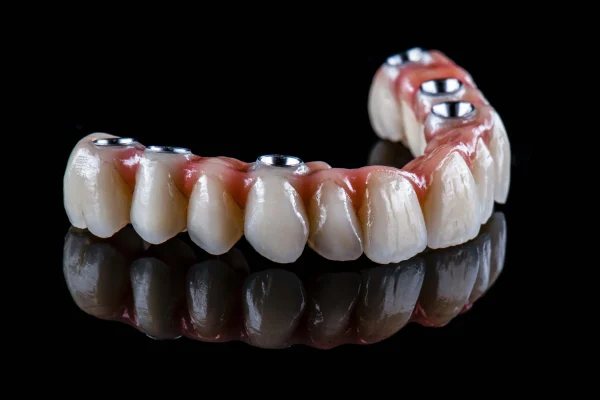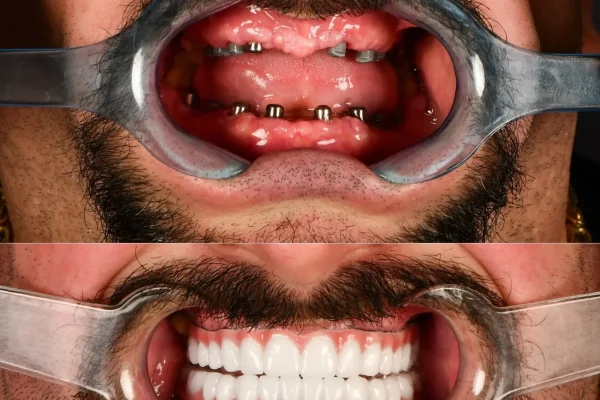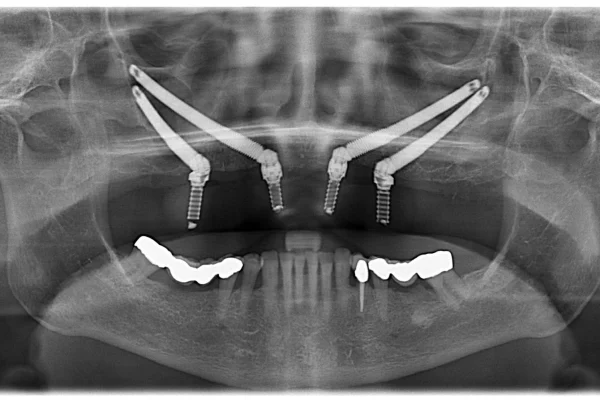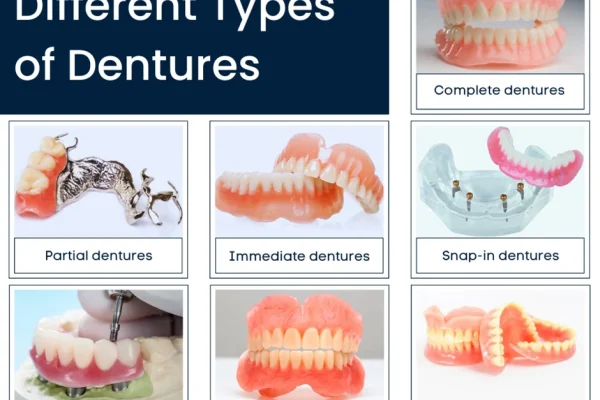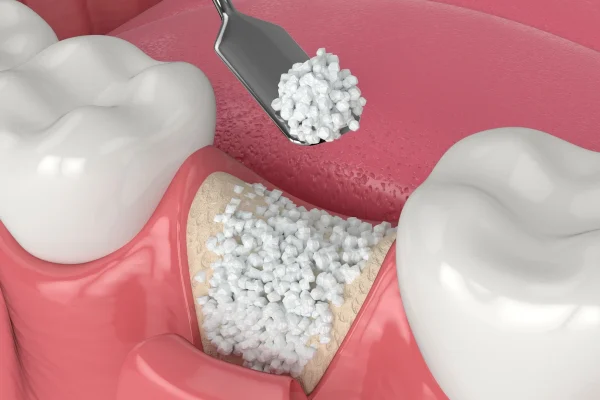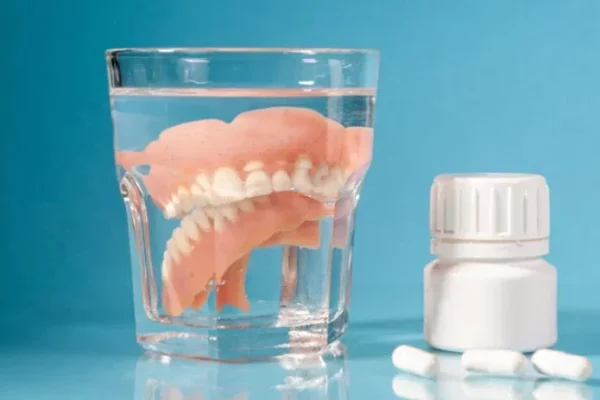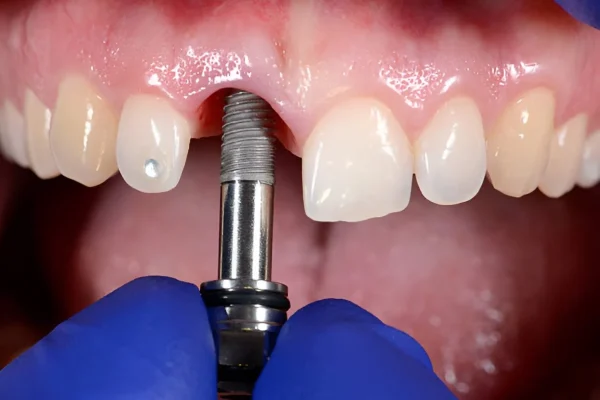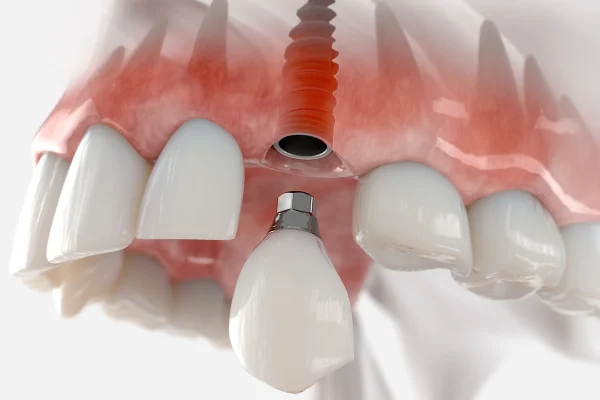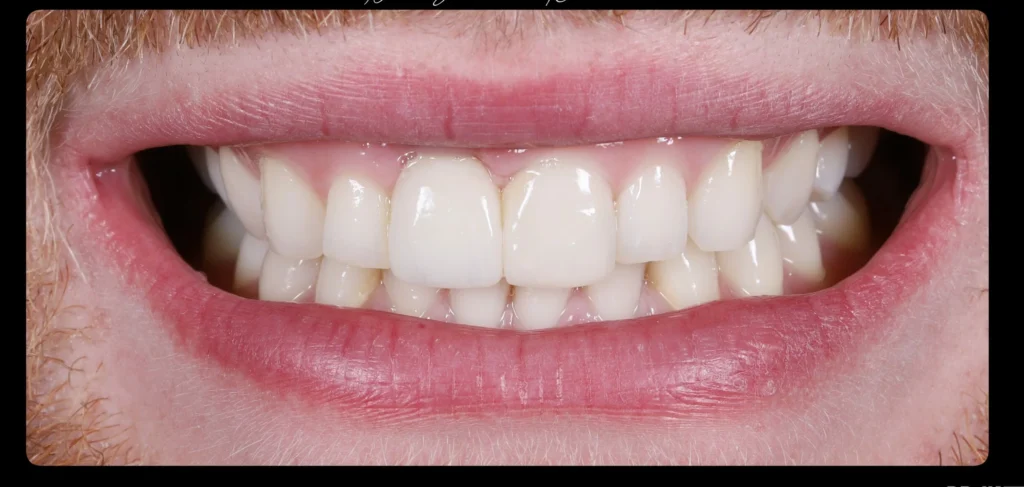
Table of Contents
ToggleKey Takeaways
- Seeking “dental implants UK cheap” means finding affordable quality, not just the lowest price; “cheap” can be a warning.
- Costs vary widely based on the number of implants, materials, surgeon experience, clinic location, and any preliminary procedures like bone grafts.
- All-on-4 or full mouth implants can range from £7,000 to £40,000+; personalised quotes are essential.
- Monthly payment plans and dental finance are widely available in the UK to make treatment more accessible.
- NHS funding for dental implants is extremely rare, reserved for specific medical cases (e.g., trauma, cancer reconstruction), not routine tooth loss.
- Going abroad for cheaper implants has risks; compare total costs, regulatory standards, and aftercare accessibility with UK options.
Dental Implants UK Cheap: How Can You Find Low-Cost Solutions Without Sacrificing Quality?
Navigating the quest for “dental implants UK cheap” is, at its heart, a delicate balancing act, a sophisticated dance between economic prudence and the unwavering demand for quality, safety, and enduring results. The core challenge, you see, isn’t merely about locating a lower price tag; it’s about ensuring that this reduced cost doesn’t come at the expense of the very things that make dental implants a superior solution. The term “cheap” in any medical or dental context understandably raises eyebrows, and it’s vital to unpack what this might truly entail. Could it mean a clinic is using less researched or potentially lower-grade implant materials? Perhaps it indicates a practitioner with less experience, or a practice cutting corners on sterilisation protocols or diagnostic technology? Or, more optimistically, could it signify a clinic operating with greater efficiency, lower overheads, or one that’s strategically pricing to attract a wider patient base using reputable, albeit more budget-friendly, implant systems? The importance of meticulous due diligence here cannot be overstated. This involves more than just comparing headline prices; it’s about delving into the credentials of the dental surgeon, the reputation of the clinic, the specific brand and type of implants being offered, the comprehensiveness of the treatment plan (including aftercare), and the transparency of the costing. Reassurance can indeed be found, as affordable options for high-quality dental implants do exist within the UK. However, they aren’t typically stumbled upon by chance. They are discovered through diligent research, asking pointed questions, seeking multiple opinions, and critically evaluating the value proposition offered, ensuring that the pursuit of “low-cost” doesn’t inadvertently lead to a “high-risk” scenario. True affordability in this realm is about securing excellent, lasting treatment that fits your budget, not simply the lowest initial outlay.
Dental Implants Albania Cheap: How Can You Find Low-Cost Solutions Without Sacrificing Quality?
Dental Implants Albania Cheap: How to Find Low-Cost Solutions Without Sacrificing Quality
Albania is one of Europe’s top destinations for affordable dental implants, offering prices up to 70% lower than the UK, Italy, or Germany — without compromising on care or safety. Here’s how to find reliable, low-cost implant treatment in Albania while ensuring quality, safety, and long-term results.
✅ Step-by-Step: How to Find Cheap but High-Quality Dental Implants in Albania
1. Look for Clinics with Verified International Standards
Choose clinics that are ISO-certified or follow European Union hygiene protocols.
Verify the implant brands used (look for names like Straumann, Nobel Biocare, Megagen, Neodent).
Check if dentists are internationally trained or speak fluent English/Italian.
Tip: Reputable clinics list their materials, dentist credentials, and sterilization protocols on their website.
2. Compare Transparent Pricing Online
Many Albanian clinics openly list implant prices.
A good price range for single tooth implants (2025):
€279–€460 (implant + abutment + crown)
€1,799–€4,200 for All-on-4 full arch
Avoid vague or “too good to be true” offers — under €250 per implant may signal:
Generic, non-certified implants
Hidden costs later (e.g., extra for crown or diagnostics)
Shorter warranty or inexperienced staff
3. ✈️ Look for All-Inclusive Dental Tourism Packages
Many top clinics in Tirana and Durres offer low-cost bundles that include:
Free initial consultation + X-ray or CBCT
Accommodation and airport transfers
All surgical + prosthetic phases in one quote
Example: “All-on-4 fixed bridge + hotel + pickup” for €2,990 – €3,990
4. Read Verified Reviews and Before/After Photos
Use platforms like Google Reviews, Trustpilot, WhatClinic, or Facebook Groups.
Look for:
Consistent 4.5+ ratings
Real patient testimonials (preferably from UK/Italian patients)
Before/after galleries with implant reconstructions
5. Ask These Key Questions Before Booking
What brand and model of implant will be used?
Are diagnostic tests (CBCT, X-rays) included in the price?
What materials are used for crowns or bridges? (zirconia preferred)
Is aftercare or revision available if complications occur?
What is the duration and number of visits needed?
Example: Cost Comparison Table
| Treatment | Price in Albania | Price in UK | Savings |
|---|---|---|---|
| Single Implant (Full) | €650 – €1,100 | €2,000 – €3,500 | 60–70% cheaper |
| All-on-4 (Fixed Arch) | €1,799 – €4,200 | €12,000 – €18,000 | 70–80% cheaper |
| All-on-6/8 | €3,100 – €6,500 | €15,000 – €25,000 | 60–75% cheaper |
Final Tips for Smart Savings Without Risk
✅ Avoid clinics that won’t specify implant brands
✅ Don’t choose based on price alone
✅ Always request a written treatment plan with itemized costs
✅ Ask for guarantee duration (implants should last 10+ years)
How Much Do Dental Implants Actually Cost in the UK?
Before we dive deeper into the “cheap” aspect, let’s establish a baseline: what exactly is the financial landscape for dental implants in the United Kingdom? Understanding the typical costs and the variables at play is paramount. One of the first things prospective patients discover is that dental implant costs are far from a one-size-fits-all figure; they are, in fact, a tapestry woven from multiple threads, varying significantly from individual to individual, clinic to clinic, and even region to region. There’s no universal price list dictated from on high. Instead, the final sum is a bespoke calculation reflecting the unique clinical needs of each patient and the specific treatment plan designed to address them. Generally, the advertised or quoted cost for a single dental implant procedure typically encompasses several key components: the implant fixture itself (the titanium post surgically placed into the jawbone), the abutment (the connector piece that sits atop the implant and supports the new tooth), and the final crown (the visible, tooth-shaped restoration). The surgical procedure for placement, any necessary imaging like X-rays or CT scans, and follow-up appointments are also usually factored in. However, this is where the path can diverge. This section aims to dissect these elements, offering a clearer perspective on average price ranges and, more importantly, exploring the myriad factors that can cause these figures to fluctuate, sometimes quite dramatically. Arming yourself with this foundational knowledge is the first crucial step in evaluating whether a “cheap” offer truly represents good value or if it’s masking hidden costs or compromises. It’s about demystifying the price tag so you can make an informed decision.
What is the Average UK Price for Full Dental Implants?
When patients inquire about the “average UK price for full dental implants,” they’re often envisioning a complete smile transformation, typically for an entire arch (all upper or all lower teeth) or even a full mouth reconstruction. This is where treatments like “All-on-4” or “All-on-6” come into play, revolutionary concepts where a full arch of prosthetic teeth is supported by just four or six strategically placed implants, respectively. The cost for such comprehensive solutions understandably represents a more significant investment than a single implant. In the UK, the average price for a single arch of full dental implants, using an All-on-4 or All-on-6 protocol, can range quite broadly, often starting from approximately £7,000 to £10,000 at the lower end for a reputable, quality-focused clinic, and potentially soaring to £20,000 or even significantly more per arch, depending on a host of influencing factors. Therefore, for a full mouth (both upper and lower arches), one might anticipate costs to potentially range from £14,000 to £40,000+, although these are very general estimations. It’s crucial to understand that these are ballpark figures. The term “full dental implants” itself can be interpreted differently; some may be referring to multiple individual implants rather than an arch-based solution. The type of final prosthetic material (e.g., acrylic, composite, or porcelain), the brand of implants, the complexity of the surgery, and any required preparatory work like bone grafting will all heavily influence this “average” price. Clinics in major metropolitan areas with higher overheads may also quote higher figures. Ultimately, a precise, personalised quotation can only be obtained following a thorough consultation and diagnostic assessment with a qualified implant dentist, who can tailor the treatment plan to your specific anatomical and aesthetic needs.
How Much Does a Full Set of Teeth Implants Cost in the UK?
The question “How much does a full set of teeth implants cost in the UK?” echoes the previous inquiry but often implies replacing all teeth in both the upper and lower jaws. Clarifying what constitutes a “full set” is key here. For many, this will indeed mean two full arches of implant-supported teeth, effectively a complete smile makeover. As discussed, this typically involves methodologies like All-on-4 or All-on-6 for each arch. Given the estimates for a single arch ranging from £7,000 to £20,000+, a “full set” could therefore theoretically range from around £14,000 to over £40,000. However, it’s not always a simple case of doubling the single-arch price, as some clinics may offer a slightly more competitive package price for treating both arches simultaneously. It’s also important to consider that a “full set” might, in some rarer clinical situations, refer to replacing many individual missing teeth with a corresponding number of individual implants and crowns, rather than a full-arch bridge. This latter approach, if replacing a very large number of teeth individually, could potentially be even more expensive due to the increased number of surgical sites and components. The specific technique chosen will depend on bone density, the patient’s preferences, and the clinician’s expertise. The cost will also reflect the material chosen for the final teeth – from robust, budget-friendlier acrylics to highly aesthetic and durable zirconia or porcelain. Remember, initial consultations are absolutely indispensable. These sessions allow the dentist to perform a comprehensive examination, including advanced imaging if necessary, to discuss your goals, and to provide a detailed, itemised treatment plan with a precise cost breakdown for your unique “full set.” This transparency is what you should seek.
What are the Dental Implants Cost Factors to Consider?
The final price tag on your dental implant treatment isn’t plucked from thin air; it’s a meticulously calculated sum influenced by a constellation of critical factors. Understanding these elements empowers you to ask the right questions and to appreciate why quotes can vary. Firstly, the number of implants needed is a primary driver; a single implant will cost significantly less than a full arch restoration. Secondly, the type and brand of implants used play a substantial role. Premium, globally recognised brands with extensive research and long-term clinical data (like Straumann, Nobel Biocare) often command a higher price than lesser-known or newer systems, reflecting their investment in quality and innovation. The material of the final crown, bridge, or denture is another key variable; high-end porcelain or zirconia restorations are more expensive than acrylic or composite alternatives, though they offer superior aesthetics and durability. Crucially, the need for preliminary procedures can add considerably to the overall cost. If you have insufficient bone volume, a bone graft or sinus lift may be necessary before implant placement, each carrying its own fee. Similarly, if existing teeth need to be extracted, this will be an additional charge. The dentist’s experience, qualifications, and the clinic’s geographical location and reputation are also significant. Highly experienced implantologists or specialists, and clinics situated in prime city centre locations with state-of-the-art facilities, naturally tend to have higher fee structures reflecting their expertise and overheads. Finally, the technology used by the clinic, such as advanced 3D CBCT scanning for diagnostics and planning, or computer-guided surgery, can enhance precision and outcomes but may also be factored into the cost. Being aware of these multifaceted components allows you to have a more informed discussion with your dentist about your treatment plan and its associated investment.
Will There Be a Dental Implant Cost Guide for 2025 with UK Prices?
Patients understandably seek the most current information, and the search for a “Dental Implant Cost Guide for 2025 with UK Prices” reflects this desire for future-proofing their financial planning. While it’s natural to want such a definitive guide, the reality of dental pricing is dynamic and multifaceted. General cost guides, like the information provided in this article, can offer valuable ballpark figures and highlight trends, but a precise, fixed “guide for 2025” is inherently an estimate. Dental implant costs evolve due to several factors: inflation affects material and operational costs for clinics; advancements in implant technology and materials can lead to price adjustments (either up or down for newer, more efficient solutions); and individual clinic pricing strategies can change based on market conditions or internal business decisions. Furthermore, the highly personalised nature of implant treatment means that even if general price ranges shift, your specific needs will always be the ultimate determinant of your individual cost. Therefore, while you might find articles projecting future costs based on current trends, the most reliable way to obtain current and forward-looking cost information is always through direct consultation with dental clinics. When you are ready to proceed, perhaps closer to 2025, clinics will be able to provide you with quotations based on the prevailing economic conditions and their fee structures at that time. For now, focusing on understanding the current cost factors, saving strategies, and financing options will put you in the strongest position, regardless of minor year-on-year price fluctuations. The fundamental principles of seeking quality and value will remain constant.
What Exactly Are “Cheap” Dental Implants and Are They Worth Considering for UK Patients?
The word “cheap,” when associated with something as significant as dental implants, immediately sparks a complex conversation. What do patients truly mean when they type “cheap dental implants” into their search bar? For most, it’s a pragmatic search for affordability, an attempt to make a highly desirable treatment financially accessible. It’s not necessarily a desire for a substandard product, but rather a hope that high-quality treatment can be found at a lower price point. The critical question then becomes: does “cheap” invariably equate to lower quality, or can it sometimes represent better value for money? This is where careful discernment is absolutely essential. The concept of evaluating cost versus long-term benefit, and importantly, potential risks, must be at the forefront of any patient’s mind. A significantly lower upfront cost might seem attractive, but if it leads to premature implant failure, complications requiring further expensive treatment, or an unsatisfactory aesthetic outcome, then the initial “saving” becomes a false economy. Conversely, some clinics may genuinely offer more competitive pricing due to greater operational efficiencies, bulk purchasing of materials, or a strategic decision to make implants more accessible, without compromising on the core tenets of quality care, reputable implant systems, and experienced clinicians. UK patients considering options marketed as “cheap” need to arm themselves with knowledge, ask probing questions, and look beyond the headline price to understand exactly what is being offered – and, crucially, what might be omitted. The true worth of any dental implant treatment lies in its longevity, functionality, and the positive impact it has on your quality of life, not just its initial price tag.
How Can You Save Money on Dental Implants in the UK Without Sacrificing Quality?
Seeking to save money on dental implants in the UK without compromising the integrity and success of your treatment is a very sensible goal. It requires a strategic approach rather than simply opting for the lowest advertised price. One of the most effective actionable tips is comparing quotes from several reputable clinics. Don’t just focus on the bottom line; examine what each quote includes – the brand of implant, the type of final restoration, follow-up care, and any guarantees. This allows for an informed, value-based comparison. Secondly, ask about different material options for the crowns or bridges. While top-tier materials like zirconia offer premium aesthetics and strength, high-quality porcelain-fused-to-metal (PFM) or even some modern composites can provide excellent, durable results at a more moderate cost, depending on the tooth’s location and functional demands. Discuss these trade-offs with your dentist. Thirdly, inquire about package deals or phased treatment plans. Some clinics offer comprehensive packages for specific treatments (like All-on-4) that might be more cost-effective than itemised pricing. Alternatively, if the full cost is a barrier, ask if the treatment can be phased, allowing you to spread the cost over a longer period, though this needs careful planning to ensure clinical appropriateness. Finally, and crucially, look for clinics with transparent pricing. A reputable clinic will be upfront about all potential costs, including consultations, diagnostics, the surgery itself, restorations, and any necessary preliminary work or aftercare. Hidden fees are a red flag. By adopting these strategies, you can navigate towards a more affordable solution while keeping quality firmly in your sights, ensuring your investment is sound.
Cheap Vs Premium Dental Implants: What’s the Real Difference?
The distinction between “cheap” and “premium” dental implants often boils down to a combination of the implant system’s manufacturer, the research and development behind it, the materials used, and the long-term clinical data supporting its efficacy. Premium implant systems, from globally renowned manufacturers like Straumann, Nobel Biocare, or Zimmer Biomet, typically come with decades of rigorous scientific research, extensive clinical trials, and a proven track record of high success rates and longevity. They invest heavily in material science (often using high-grade titanium alloys or ceramic options like zirconia), surface technology (which aids osseointegration – the bonding of implant to bone), and precision engineering of components. This often translates to greater predictability, better aesthetic outcomes, and robust manufacturer support and warranties. “Cheaper” implant systems, on the other hand, may come from newer or less established companies. While some may offer perfectly adequate clinical performance, especially in straightforward cases, they might lack the extensive long-term data and research investment of their premium counterparts. The potential differences can lie in the purity or alloy of the titanium, the sophistication of the surface treatment, the precision of the connection between implant and abutment (which can affect long-term stability and risk of complications like screw loosening), and the scope of the manufacturer’s warranty. For a patient, deciding whether the extra cost for a premium system is justified depends on individual circumstances, the complexity of their case, their budget, and their risk tolerance. A detailed discussion with an experienced implant dentist, who can explain the pros and cons of different systems they offer relative to your specific needs, is crucial for making an informed choice. It’s not always as simple as one being inherently “bad” and the other “good,” but rather about matching the right system to the right clinical scenario and patient expectations.
How Can You Get High-Quality Implants at a Lower Cost?
Securing high-quality dental implants at a more manageable cost is indeed achievable with a thoughtful and informed approach, moving beyond the simple allure of a “cheap” label. One key strategy is to focus on experienced dentists who may offer competitive pricing due to their efficiency and volume. A highly skilled implantologist who performs these procedures regularly can often work more efficiently, potentially streamlining treatment times and associated costs, without compromising on the quality of care. They may also have established relationships with implant suppliers, allowing them to negotiate better rates for high-quality systems. Another practical tip is to consider clinics located slightly outside major city centres or prime urban locations. Clinics in less central areas often have lower overheads (rent, rates), which can translate into more competitive fees for patients, while still offering excellent standards of care and technology. Don’t assume that quality is solely confined to the most expensive postcodes. Furthermore, always ask about any available offers, promotions, or payment plans. Many clinics run periodic offers, especially for new patient consultations or specific treatments. More importantly, virtually all reputable clinics offer dental finance or payment plans, which, while not reducing the total cost, can make the investment significantly more manageable by spreading payments over time, often with interest-free options for shorter terms. The goal is to find that sweet spot where proven quality, experienced clinicians, and a manageable financial outlay intersect. Thorough research into clinic reviews, dentist credentials, and transparent discussion about all options are paramount to achieving this.
Are There Cheap Dental Implant Providers in the UK That Don’t Compromise on Quality?
The question of whether “cheap” dental implant providers in the UK can deliver treatment without compromising on quality is a nuanced one. Yes, it is possible to find clinics that market themselves as “affordable” or “low-cost” and still provide a good standard of care, but this requires extremely careful vetting from the patient’s side. These clinics might achieve lower price points through legitimate means such as higher patient volume, efficient operational systems, sourcing quality but perhaps less globally-branded implant systems, or having lower overheads due to location. However, the term “cheap” can also be a red flag if it signifies cutting corners. To vet such providers, your first step should be to check patient reviews and testimonials from multiple independent sources. Look for consistent feedback on outcomes, care, and aftercare. Crucially, verify the qualifications and experience of the dentists performing the implant surgery. Are they registered with the General Dental Council (GDC)? Do they have specific postgraduate qualifications or extensive experience in implantology? Ask specifically about the brand and type of dental implants used and research them independently. Enquire about the warranty or guarantee offered on the implants and the prosthetic work. A comprehensive consultation is vital; use this opportunity to assess the clinic’s professionalism, hygiene standards, the thoroughness of their assessment, and their willingness to answer all your questions transparently. Do not base your decision solely on price. If a deal seems too good to be true, it often is. The aim is to find value – which is a combination of excellent quality, experienced care, and a fair price – rather than just the lowest possible cost, which could lead to expensive revisions or health issues down the line.
What is a Mini Dental Implant and Could It Be a Cheaper Alternative?
Mini Dental Implants (MDIs) are indeed a distinct category within implant dentistry and are often presented as a potentially cheaper alternative to traditional, or conventional, dental implants. As their name suggests, MDIs are significantly smaller in diameter than standard implants, typically less than 3mm wide, compared to the 3.5mm to 6mm range for conventional implants. This smaller size is a key differentiator and influences their application, placement procedure, and cost. The procedure for placing MDIs is often less invasive, sometimes requiring only a small pilot hole without extensive surgical flaps, which can mean quicker placement, reduced healing time, and less post-operative discomfort for the patient. Because the surgical procedure can be simpler and the implants themselves are generally less complex and made with less material, the overall cost of MDI treatment is usually lower than that of traditional implants. This reduced cost, coupled with a less daunting surgical experience, makes them an attractive option for certain patients looking for more affordable solutions, particularly for specific applications like stabilising loose dentures. So, yes, in specific contexts, MDIs can represent a more budget-friendly pathway to improved dental function and stability, but it’s crucial to understand their limitations and appropriate uses before considering them purely as a “cheaper” like-for-like substitute for all situations where traditional implants might be recommended. Their suitability is highly case-dependent.
What is the Downside of Mini Implants?
While Mini Dental Implants (MDIs) offer advantages in terms of cost and procedural simplicity, they also come with certain limitations and potential downsides that patients must understand. A primary consideration is their reduced strength and load-bearing capacity compared to traditional implants due to their smaller diameter. This means MDIs are generally not suitable for supporting single crowns or bridges in areas of high chewing force, such as replacing individual molars. Attempting to use them in such applications can lead to a higher risk of implant fracture or failure. Their long-term success rates, particularly when used for fixed restorations (like single crowns), may not be as extensively documented or as high as those for conventional implants in similar roles. Another potential downside is that because they are often a single-piece design (implant and abutment combined), there’s less flexibility in angling the restoration if the implant placement isn’t perfectly ideal, which can sometimes compromise the final aesthetic outcome or the distribution of forces. Furthermore, while excellent for denture stabilisation, if an MDI fails, replacement can sometimes be more complex than with a traditional two-piece implant system. The bone-to-implant contact area is also smaller, which might be a factor in long-term stability, especially in patients with poorer bone quality or density. Therefore, while MDIs have a valuable role, particularly in securing dentures for patients who might not be candidates for conventional implants due to bone volume or financial constraints, their application needs to be carefully considered by an experienced dentist to avoid inappropriate use that could lead to disappointment or future complications.
Who is a Good Candidate for Mini Dental Implants?
Identifying a good candidate for Mini Dental Implants (MDIs) requires a careful assessment by a qualified dentist, as their suitability is quite specific. The ideal patient profile for MDIs typically includes individuals who are primarily seeking to stabilise loose or ill-fitting dentures, particularly lower dentures, which are notoriously prone to movement. For these patients, MDIs can provide a significant improvement in comfort, confidence, and chewing ability, often at a lower cost and with a less invasive procedure than would be required for traditional implant-retained dentures. MDIs can also be a viable option for patients with significantly reduced bone width where placing conventional implants would necessitate extensive bone grafting procedures. If a patient is medically compromised and cannot undergo more invasive surgery, or if they have financial constraints that make traditional implants prohibitive for denture stabilisation, MDIs can offer a very practical solution. They are sometimes used as a temporary anchorage device during orthodontic treatment or to support interim prostheses while healing occurs for conventional implants. However, it’s crucial to reiterate that MDIs are generally not recommended as the primary solution for replacing single missing teeth, especially posterior teeth that bear significant chewing loads, or for supporting extensive fixed bridgework. A good candidate understands the specific purpose and limitations of MDIs, has realistic expectations, and has been thoroughly evaluated by their dentist to confirm that MDIs are the most appropriate and beneficial treatment for their particular clinical situation and dental goals.
Where Can You Go in the UK to Find the Cheapest Dental Implants?
The quest to find the “cheapest” dental implants in the UK is a common starting point for many, but it’s essential to frame this search correctly. Rather than chasing an absolute rock-bottom price, the goal should be to find the best value – that is, high-quality, safe, and durable implant treatment at the most competitive and transparent price possible. There isn’t a single town or city that holds a monopoly on “cheap” implants, as pricing is clinic-specific. However, general strategies can help you locate more affordable options. This often involves looking beyond the most prominent, high-rent city centre locations, as clinics with lower overheads may be able to pass some savings onto patients. It also involves understanding why some clinics can offer lower prices without necessarily compromising on the essentials. This section will delve into these approaches, highlighting what to look for, the questions to ask, and how clinics might structure their offerings to be more budget-friendly. Remember, diligent research, multiple consultations, and a focus on the clinician’s experience and the quality of materials used are far more critical than pinpointing a geographical “cheap spot.” True affordability comes from a successful long-term outcome, not just a low initial bill. Investing a little more time in your research can save you a considerable amount of money and potential distress in the future. It’s about smart shopping for a sophisticated medical procedure.
How Are Some Clinics Able to Offer Implants at Such a Low Cost?
When you encounter a clinic offering dental implants at a notably lower cost, it’s natural to wonder how they achieve this. There are several legitimate reasons why some clinics might have more competitive pricing structures without necessarily cutting crucial corners. Firstly, higher volume of procedures can lead to economies of scale; clinics that perform a large number of implant treatments may be able to negotiate better prices from implant suppliers and labs, and their teams become highly efficient, potentially reducing chair time. Secondly, efficient workflows and investment in modern technology can streamline the treatment process. For example, digital scanning and in-house milling capabilities (CAD/CAM) can sometimes reduce laboratory fees and turnaround times. Thirdly, as mentioned, negotiated rates with implant suppliers are key; some clinics may choose to work primarily with reputable but perhaps slightly less globally-marketed implant brands that offer a good balance of quality and cost-effectiveness. The clinic’s location and overheads play a significant role; a practice outside a prime city centre will typically have lower rental and operational costs, allowing for more flexible pricing. Some clinics might also focus on specific types of implant treatments, such as All-on-4 or denture stabilisation, allowing them to specialise and optimise their processes for those procedures. However, it’s also vital to be aware of potential red flags if prices seem too good to be true. This could indicate the use of substandard materials, less experienced clinicians, rushed procedures, or hidden costs that emerge later. Always inquire about what’s included in the quoted price and the specifics of the materials and personnel involved.
What Do You Need to Know About Getting Started with Affordable Dental Implants?
Embarking on your journey towards affordable dental implants requires a proactive and informed approach from the very beginning. The initial steps you take can significantly influence both the cost and the outcome of your treatment. Firstly, book consultations with a few different dentists or implant clinics. Don’t commit to the first one you find. Gaining multiple perspectives allows you to compare treatment plans, clinician experience, clinic atmosphere, and, of course, costs. Most reputable clinics offer initial consultations, sometimes free or at a nominal charge, which are invaluable for information gathering. Secondly, prepare a list of pertinent questions to ask during these consultations. These should cover the dentist’s specific experience with implants (how many they place per year, their success rates), the brand and type of implants they recommend for you and why, details of the proposed procedure, the full breakdown of costs (including any potential additional procedures like bone grafts or extractions), and what aftercare and warranties are included. Understanding that “affordable” is a relative term is also crucial; what’s affordable for one person may not be for another. Your aim should be to find a solution that fits comfortably within your budget without compromising on the essential aspects of quality care, materials, and expertise. Be wary of any pressure to make a quick decision or offers that seem excessively cheap without clear justification. Your health and long-term satisfaction are paramount, so starting with thorough research and open communication is key.
Are There Affordable Low Cost Dental Implants in UK cities like Cambridge, London, Manchester, Birmingham, or Wolverhampton?
Patients often refine their search for affordable dental implants by including specific city names, such as Cambridge, London, Manchester, Birmingham, or Wolverhampton, which is a logical step in finding convenient and accessible care. The good news is that affordable, low-cost dental implant options can generally be found across many UK cities and regions, not just in a few select “cheap” hotspots. Pricing for dental implants is primarily determined by individual clinic factors rather than being strictly dictated by city-wide averages, although general overhead costs can be higher in major metropolitan hubs like London, potentially influencing overall fee structures. However, even within these larger cities, competition among dental practices can lead to a range of pricing options. You might find clinics in suburban areas of London or Manchester, for instance, offering more competitive rates than those in the very centre. Similarly, cities like Birmingham, Wolverhampton, and Cambridge will have a spectrum of clinics, from high-end specialist centres to general practices offering implant services at various price points. The key to finding affordable options in your chosen city, or a nearby one, is diligent local research. Use online search engines with terms like “affordable dental implants [your city],” “dental implant offers [your city],” and meticulously check clinic websites for information on their services, fees, and any patient finance plans. Reading local patient reviews and checking dental directories can also unearth clinics that balance quality with cost-effectiveness. Don’t assume you have to travel vast distances; explore the options within your accessible geographical area first.
Are There “Cheap Implants UK” Offers That Are Genuinely Low Cost and Affordable?
When you encounter promotional language like “Cheap Implants UK” or “Low-Cost Dental Implant Deals,” it’s wise to approach with an informed and cautiously optimistic mindset. Yes, there can be genuinely low-cost and affordable offers that still represent good value, but discerning these from potentially problematic ones requires careful scrutiny. A genuinely affordable offer might stem from a clinic running a limited-time promotion, introducing a new, cost-effective but reputable implant system, or having streamlined their processes to pass savings to patients. However, it’s crucial to look beyond the enticing headline price. Your first step should be to understand exactly what is included in the advertised offer. Does it cover the implant, abutment, final crown, surgical placement, all necessary X-rays and diagnostics, and follow-up appointments? Or is it merely the cost of the implant fixture itself, with significant additional charges to come? Always check the terms and conditions associated with any offer. Are there specific eligibility criteria? Is it for a particular type of implant or restoration material that may not be ideal for your needs? Most importantly, the clinic’s reputation and the qualifications of the dentists should never be overlooked, regardless of the price. A detailed consultation is non-negotiable. This is your opportunity to ask direct questions about the offer, the materials used, and the expected outcomes. If a clinic is transparent and can clearly justify its pricing while demonstrating a commitment to quality care, then a “cheap” offer might indeed be a genuinely affordable and worthwhile opportunity. Always prioritise long-term health and success over short-term savings.
How Can You Afford Dental Implants in the UK, Especially if Money is Tight?
The realisation that dental implants, even the more “affordable” options, represent a significant financial undertaking can be daunting, particularly if your budget is already stretched. However, the desire for a healthy, functional, and confident smile is a powerful motivator, and thankfully, there are various financial strategies and assistance options available to UK patients that can bring this transformative treatment within reach. It’s crucial to acknowledge the investment involved but also to explore the avenues designed to make it more manageable. This section is dedicated to shedding light on these practical solutions, from payment plans offered directly by clinics to third-party financing and understanding what, if any, support might be accessible through other channels. The emphasis here is on empowerment – providing you with the knowledge to navigate the financial aspect of your implant journey with greater confidence. It’s about shifting the focus from “can I afford this?” to “how can I make this affordable?” Many people successfully manage the cost of dental implants each year by leveraging these methods, proving that a tight budget doesn’t necessarily have to be an insurmountable barrier to achieving a lasting dental solution. The key is to research these options thoroughly and find the one that best aligns with your financial circumstances and treatment plan.
Can You Pay Monthly for Dental Implants or Other Dental Work?
Absolutely, the option to pay monthly for dental implants, and indeed many other forms of significant dental work, is widely available across the UK and has become a very popular way for patients to manage the cost of treatment. Many, if not most, dental clinics recognise that the upfront cost of procedures like implants can be a barrier for patients. To address this, they often partner with specialist dental finance providers or offer their own in-house payment plans. These plans allow you to spread the total cost of your treatment over an agreed period, typically ranging from 6 months to several years, through regular monthly instalments. A common and attractive feature of these plans is the availability of interest-free credit for shorter repayment periods, often up to 12 or sometimes even 24 months. This means you pay only the cost of the treatment, with no added interest, making it a very straightforward way to budget. For longer repayment terms, which result in lower monthly payments, interest-bearing options are usually available, and it’s important to understand the APR (Annual Percentage Rate) and total amount repayable in such cases. Eligibility for these finance plans typically involves a credit check, and you’ll need to meet the lender’s criteria. The application process is often quick and can usually be completed at the dental practice. This facility transforms a potentially prohibitive lump sum into a series of manageable bites, making high-quality dental care far more accessible. Always ask your chosen clinic about the payment plans they offer.
Can You Get Finance for Dental Implants?
Yes, securing finance specifically for dental implants is a very common and accessible route for many UK patients. Beyond the payment plans often facilitated directly through dental clinics (which are themselves a form of finance), there are several other avenues to explore. Many specialist dental finance providers work with a network of dental practices, offering tailored loan products designed for medical and dental treatments. These companies understand the nature of dental procedures and often provide competitive rates and flexible terms. Another option is to consider a personal loan from a bank or building society. If you have a good credit history, you might be able to secure a personal loan with a favourable interest rate, which you can then use to pay for your dental implant treatment. It’s crucial to compare interest rates (APRs), loan terms, and any associated fees very carefully across different lenders to ensure you’re getting the best possible deal. Some patients might also consider using a credit card, particularly if they can take advantage of a 0% interest promotional period on purchases. However, this requires discipline to pay off the balance before the interest-free period ends, as standard credit card interest rates can be very high. When considering any form of finance, it’s vital to assess your ability to meet the monthly repayments comfortably throughout the loan term and to understand the total cost of borrowing. Reputable clinics will be happy to discuss finance options with you transparently and can often guide you through the application process for their partnered finance providers.
What Can You Do If You Have Bad Teeth and No Money in the UK?
Facing dental problems, especially if they are extensive or causing pain, when you have limited financial resources can feel incredibly overwhelming, and it’s a situation that requires a compassionate and practical approach. If you find yourself with “bad teeth and no money” in the UK, the first priority should be to address any immediate pain, infection, or urgent dental needs. You should explore options for essential dental care through the NHS. While NHS dental services have their limitations and waiting lists can be an issue, they are there to provide clinically necessary treatment to maintain oral health, which can include pain relief, treatment for infections, and extractions if deemed necessary. Check your eligibility for free or reduced-cost NHS dental treatment based on your circumstances (e.g., certain benefits, low income). For more extensive restorative work like implants, which are rarely covered by the NHS, the path is more challenging but not entirely closed. Some dental charities or community dental services may occasionally offer reduced-cost or subsidised care for those in severe need, although access to such services for complex treatments like implants is very limited and specific. In the longer term, if implants are your goal, saving gradually towards the cost, even small amounts, can make a difference over time. Simultaneously, explore the dental payment plans and finance options discussed previously, as these are specifically designed to make treatment accessible for those who cannot pay upfront. While waiting or saving, consider more immediately affordable tooth replacement options such as well-made dentures or bridges (which may have some NHS availability or lower private costs) as an interim solution to improve function and aesthetics, while you plan for a more permanent implant solution in the future. Openly discussing your financial constraints with a sympathetic dentist can also help identify the most realistic and phased treatment pathways.
Are There Ways to Get Help Paying for Dental Implants?
Yes, there are several avenues to explore when looking for help to pay for dental implants in the UK, primarily centred around making the cost more manageable rather than obtaining direct grants for the full amount. The most common and accessible form of “help” comes in the form of clinic-based payment plans and third-party dental finance. As detailed earlier, these allow you to spread the cost over months or years, often with interest-free options for shorter terms, significantly easing the immediate financial burden. Some patients may explore accessing their pension funds on compassionate grounds, particularly if their dental issues are severely impacting their health and quality of life. However, the rules for early pension release in the UK are very strict and typically reserved for cases of serious ill health or incapacity, with dental treatment rarely meeting the high threshold unless it’s linked to a more severe underlying medical condition. This route is significantly less common or straightforward in the UK compared to some other countries’ superannuation access rules and should be approached with extreme caution and professional financial advice. In some instances, individuals might receive support from family members if they are in a position to help. While not a formal system, it’s a private avenue some explore. Beyond these, specific grants or widespread charitable funding solely for elective dental implants for the general population are, unfortunately, not a common feature of the UK system. The main “help” lies in making the treatment affordable through structured payment solutions and thorough financial planning, ensuring you choose a reputable clinic that offers transparent pricing and quality care.
What is the Bupa Smile Plan and Can It Help with Costs?
The Bupa Smile Plan is one example of a dental insurance or dental discount plan available in the UK market, and there are similar offerings from other providers. These plans are designed to help individuals manage the costs of routine and sometimes more complex dental treatments by either contributing towards the cost or providing discounts at participating dentists. Whether a Bupa Smile Plan (or any similar dental plan) can significantly help with the costs of dental implants depends entirely on the specific terms and conditions of the individual policy you hold or are considering. Many basic dental insurance plans focus primarily on covering routine check-ups, hygiene visits, and a portion of costs for common restorative treatments like fillings, crowns, or extractions. Coverage for high-value elective procedures like dental implants is often more limited or may only be included in higher-tier, more expensive plans. Some plans might offer a set contribution towards implant treatment, or a percentage discount if you use a dentist within their network, but it’s unlikely to cover the full cost. There might also be annual limits on the total amount the plan will pay out, and waiting periods before you can claim for certain treatments. Therefore, if you are considering such a plan specifically to help with implant costs, it is absolutely crucial to meticulously review the policy documents: check the level of coverage for implants, any exclusions, waiting periods, annual limits, and the network of dentists. While these plans can be beneficial for overall dental maintenance and some restorative work, their impact on significantly reducing the out-of-pocket expense for dental implants varies widely, and they should be seen as a potential partial aid rather than a complete solution for funding implant treatment.
Can All on 4 & 6 Dental Implants Be More Affordable with Monthly Payments?
Absolutely. Full-arch restorations like All-on-4 and All-on-6 dental implants, while representing a significant investment due to their complexity and the transformative results they deliver, can indeed be made considerably more affordable and accessible through monthly payment options. Given that these treatments typically involve placing four or six implants to support an entire arch of new teeth, the upfront cost can be substantial, often running into many thousands of pounds per arch. Recognising this, the vast majority of dental clinics in the UK that offer All-on-4 and All-on-6 procedures also provide robust dental finance plans. These plans are specifically designed to help patients manage these higher treatment costs by breaking them down into a series of regular, predictable monthly instalments spread over an agreed period. This period can range from 6-12 months (often with interest-free options) up to 3-5 years or even longer (usually with interest applied for longer terms). By opting for monthly payments, patients can proceed with life-changing treatment without the immediate strain of a large lump-sum payment. This makes sophisticated solutions like All-on-4 or All-on-6 a realistic possibility for a much wider range of people who need extensive dental restoration but might otherwise be deterred by the initial headline cost. When discussing All-on-4 or All-on-6 with your dentist, always inquire about the specific finance options they have available, including any interest-free periods, the APR for longer terms, and the application process. This financial flexibility is a key enabler for many patients achieving a full smile reconstruction.
Can You Get Free Dental Implants or Financial Aid Through NHS or Government Grants in the UK?
The prospect of obtaining free dental implants or significant financial aid through public systems like the NHS or government grants is a frequently asked question, born out of a natural desire to access the best treatment without incurring substantial personal cost. It’s a hope many people hold, especially when faced with the expense of private dental care. However, it’s crucial to approach this topic with very realistic expectations, particularly within the context of the UK’s healthcare framework. While the NHS provides a vital service for essential dental care, and government support exists for various health and disability needs, the provision of dental implants under these umbrellas is extremely limited and subject to very strict criteria. This section aims to clarify the realities of accessing implants through these routes, helping you understand the specific circumstances where some level of support might be available, and why, for the vast majority of cases, implants remain a privately funded treatment. Setting these expectations accurately from the outset can save considerable time and potential disappointment, allowing you to focus your efforts on the more commonly available avenues for making implant treatment affordable. The system is primarily designed to address acute needs and basic dental health, with advanced elective procedures like implants generally falling outside this scope for most of the population.
Can You Get Full Implants on the NHS or Does the NHS Fund Dental Implants at All?
The straightforward answer regarding whether you can get full dental implants, or indeed any routine dental implants, on the NHS is, for most people, no. The National Health Service primarily focuses on providing clinically necessary dental treatment to secure and maintain oral health, which typically includes check-ups, fillings, extractions, dentures, and crowns where there’s a functional need. Dental implants are generally considered an advanced, elective, and cosmetic (in many contexts) procedure and are therefore not routinely available on the NHS for common tooth loss due to decay, gum disease, or general wear and tear. However, there are very specific and strict clinical criteria under which NHS funding for dental implants may be considered, but these instances are rare and usually managed through hospital-based dental services rather than high street NHS dentists. Such exceptional circumstances might include patients who have lost teeth due to significant facial trauma (e.g., a serious accident), as part of reconstructive surgery following oral cancer treatment, or for individuals with certain congenital conditions or developmental issues that mean they cannot wear dentures and have no other viable restorative options. Even in these cases, funding is not guaranteed and is subject to rigorous assessment by a specialist team and local NHS funding policies. The waiting lists for NHS-funded implant treatment, where approved, can also be very long. Therefore, for the average patient seeking implants to replace missing teeth, the NHS is unlikely to be a source of funding.
Is It Possible to Get a Government Grant for Dental Implants in the UK?
The idea of obtaining a specific “government grant” for individuals to pay for dental implants in the UK is, unfortunately, largely a misconception. There are no direct, widely available government grant schemes designed to fund dental implant treatment for the general public. Government financial support related to health and disability typically comes in the form of broader benefits, such as Personal Independence Payment (PIP) or Universal Credit, which are intended to help with the extra costs of living with a long-term health condition or disability, rather than being earmarked for specific elective medical or dental procedures. While these benefits can, of course, contribute to an individual’s overall budget, from which they might choose to allocate funds towards dental care, they are not grants for dental implants per se. Some very limited and highly specific charitable grants may exist through non-governmental organisations, but these are often for individuals facing extreme hardship or with very particular medical circumstances, and they are not a mainstream funding route for dental implants. The primary mechanisms for making implants more financially manageable in the UK revolve around clinic payment plans, private dental finance, and personal savings, rather than direct government subsidies for this specific treatment. It’s important to distinguish between general welfare support and dedicated funding for elective dental procedures, as the latter is generally not a feature of the UK system for implants.
How Can You Get Free Dental Implants in the UK, If At All?
The prospect of getting truly “free” dental implants in the UK is exceptionally rare and limited to very specific, and often narrow, circumstances. As discussed, the most commonly cited potential avenue is through the NHS, but this is restricted to exceptionally strict clinical criteria, such as severe trauma, post-cancer reconstruction, or specific developmental anomalies where no other prosthetic solution is viable. This route is not available for routine tooth loss. Another highly limited possibility might be through participation in clinical trials for new implant systems or techniques. These trials, run by universities or dental hospitals, sometimes offer treatment at no cost or reduced cost to eligible participants. However, eligibility is tightly controlled based on the research protocol, places are scarce, and you would be part of an experimental study. A further, albeit also uncommon, pathway could be through dental schools or teaching hospitals. In some instances, postgraduate students, under strict supervision from experienced specialists, may perform implant treatments at a reduced cost or, very rarely, as part of specific teaching programmes. However, waiting lists for such opportunities are typically very long, case selection is specific to teaching needs, and treatment may take longer than in a private setting. For the vast majority of people seeking dental implants in the UK, the treatment will involve private fees. The concept of widely available “free” implants is, regrettably, not a reality within the current UK healthcare landscape. The focus should therefore be on finding high-value, affordable options and manageable payment solutions.
Do Over 60s Get Free Dental Treatment That Could Cover Implants?
The rules around free NHS dental treatment for over 60s vary across the different nations of the UK, and it’s crucial to understand that even where free routine NHS dental treatment is available, this typically does not extend to elective procedures like most dental implants. In England, for example, there is no automatic exemption from NHS dental charges simply based on being over 60, unless you also receive certain qualifying benefits. In Scotland, Wales, and Northern Ireland, the rules differ, with some offering free NHS check-ups or more extensive exemptions based on age or other criteria for NHS-banded treatments. However, the critical point remains that dental implants are generally not provided as a standard NHS treatment. Therefore, even if an individual over 60 qualifies for free or reduced-cost routine NHS dental care (such as examinations, fillings, or dentures), this entitlement does not automatically translate into eligibility for free dental implants. Implants would still fall under the exceptional clinical criteria pathway for NHS funding, which is unrelated to age-based exemptions for routine care. So, while being over 60 might reduce or eliminate costs for standard NHS dental services in some parts of the UK, it doesn’t open a door to free dental implants unless those very specific and severe clinical needs (like post-trauma or cancer reconstruction) are met, which are assessed independently of age.
Does PIP Entitle You to Free Dental Treatment Relevant to Implants?
Personal Independence Payment (PIP) is a benefit in the UK designed to help adults with the extra costs associated with a long-term illness or disability. It is not means-tested and can be paid whether you are working or not. However, receiving PIP does not automatically entitle you to free dental treatment, and certainly not specifically to free dental implants. While having PIP signifies that you have a condition that affects your daily life, eligibility for free NHS dental treatment is determined by a separate set of criteria, primarily related to receiving certain other income-based benefits (like specific levels of Universal Credit, Income Support, Jobseeker’s Allowance, or Pension Credit Guarantee Credit) or holding specific exemption certificates. Some individuals who receive PIP may also receive one of these qualifying benefits, which would then make them eligible for free NHS dental treatment within the standard NHS scope (which, as we’ve established, rarely includes implants). But PIP itself is not the qualifying factor for free dental care. Furthermore, even if someone receiving PIP does qualify for free NHS dental treatment, this would only cover treatments provided under NHS arrangements. Since dental implants are only funded by the NHS in very exceptional clinical circumstances (unrelated to PIP status), receiving PIP would not change this fundamental aspect. Therefore, while PIP provides valuable financial support for managing a disability, it doesn’t directly grant access to free dental implants.
Is Getting Dental Implants in the UK a Better Option Than Going Abroad for Cheaper Prices?
The allure of significantly cheaper dental implant prices advertised in countries overseas, often dubbed “dental tourism,” presents a compelling dilemma for many UK patients. When faced with quotes for treatment in the UK that can run into thousands, the prospect of saving a substantial sum by travelling abroad to places like Turkey, Hungary, Poland, or parts of Asia can seem incredibly attractive. However, this decision is far from straightforward and involves weighing potential cost savings against a range of other critical factors, including regulatory standards, continuity of care, managing complications, and the overall patient experience. This section aims to provide a balanced perspective, exploring the pros and cons to help you make an informed choice that prioritises not just your wallet, but also your long-term health and peace of mind. The key is to look beyond the headline price and consider the total picture – the risks, the benefits, and the practicalities of seeking complex dental treatment far from home. While cost is undeniably a major driver, the value of safety, quality, and accessible aftercare within a familiar regulatory framework cannot be easily dismissed. It’s a deeply personal decision, but one that should be made with eyes wide open to all potential outcomes.
Why Might You Choose a UK Clinic Over an Overseas Provider for Dental Implants?
Opting for a UK-based clinic for your dental implant treatment offers several significant advantages, particularly when considering the long-term implications and complexities of such a procedure. Firstly, UK dental professionals are highly regulated by the General Dental Council (GDC), and clinics are inspected by bodies like the Care Quality Commission (CQC) in England. These organisations enforce stringent standards for training, qualifications, hygiene, patient safety, and ethical practice, providing a level of assurance that can be harder to verify overseas. Secondly, ease of follow-up care and addressing complications is a major factor. Dental implant treatment often requires multiple appointments over several months, and ongoing maintenance is crucial. Should any issues or complications arise, having your treating dentist readily accessible in the UK is far more convenient and often safer than needing to arrange travel abroad for urgent attention. Thirdly, there are typically no language barriers when dealing with UK clinics, ensuring clear communication and understanding throughout the treatment process, which is vital for informed consent and patient satisfaction. Fourthly, in the unfortunate event that something does go wrong, you have access to established legal recourse and complaints procedures within the UK system, which may be more complex or limited if your treatment was performed overseas. Finally, there’s the sheer convenience of not having to factor in international travel, accommodation, and time off work for multiple appointments, which can add stress and hidden costs to overseas treatment. Choosing a UK clinic offers a framework of familiarity, robust regulation, and accessible continuity of care.
How Do Dental Implant Prices Abroad Compare to the UK?
There’s no denying that, on paper, dental implant prices advertised by clinics in many overseas countries can appear substantially lower than typical UK prices. Countries in Eastern Europe (such as Hungary, Poland, Czech Republic), Turkey, and some parts of Asia (like Thailand or India) are well-known dental tourism destinations often promoting savings of 50-70% or even more compared to average Western European or North American costs. For example, a single dental implant that might cost £2,000-£3,000 in the UK could be advertised for £500-£1,000 abroad. Full mouth restorations like All-on-4 could see even more dramatic price differences. These lower prices are often attributable to lower labour costs, reduced overheads (rent, utilities, staff wages), different taxation systems, and sometimes the use of different, potentially less expensive, implant systems or materials. However, it is absolutely critical for patients to remember that these headline prices often do not include the significant additional costs associated with dental tourism. These include flights for potentially multiple trips (initial consultation/surgery, and then for fitting final restorations, plus any follow-ups), accommodation, travel insurance (which may not cover elective dental work complications), food, and time taken off work. When all these ancillary expenses are factored in, the perceived savings can diminish, though often a cost advantage may still remain. The key is to calculate the total potential cost of going abroad, not just the advertised treatment price, and then weigh this against the non-financial factors.
Should You Consider Getting Cheap Dental Implants Abroad? What Are the Risks?
Considering “cheap” dental implants abroad requires a very careful evaluation of the potential risks alongside the apparent cost savings. While many people have successful experiences with dental tourism, significant risks do exist and should not be underestimated. One major challenge is the difficulty in thoroughly assessing clinician qualifications and clinic standards from afar. Regulatory bodies and oversight may differ significantly from UK standards, making it harder to verify credentials, experience levels, hygiene protocols, and the quality of materials used. There can be variations in materials and techniques, with some overseas clinics potentially using implant systems that are less well-researched or not approved for use in the UK, which could impact long-term success or the ability to get follow-up care back home. A critical risk involves complications arising after returning to the UK. If you experience infection, implant failure, or other issues, who manages them? Your UK dentist may be hesitant or unable to treat complications arising from work done abroad due to unfamiliarity with the system used or medico-legal concerns. This could necessitate further expensive travel back to the original overseas clinic or seeking specialist care in the UK at considerable cost. The lack of continuity of care is a significant downside; implant treatment is a process, not a one-off event, and follow-up is crucial. Finally, there’s the potential for rushed treatment, as clinics catering to dental tourists may try to condense procedures into a short timeframe to fit travel schedules, which might not always be clinically optimal and could compromise healing or outcomes.
Can UK Clinics Genuinely Be “Cheaper Than Going Abroad” for Dental Implants?
The claim by some UK clinics that their dental implant treatment can be “cheaper than going abroad” might seem counterintuitive at first glance, given the often significantly lower headline prices advertised by overseas providers. However, this assertion can indeed hold true when a comprehensive, like-for-like comparison of the total cost and overall value is made. UK clinics making this claim are typically factoring in all the associated expenses and potential hidden costs of dental tourism that patients might initially overlook. These include multiple return flights (for assessment, surgery, placement of final restorations, and any follow-up or review appointments), accommodation costs for each trip, travel insurance (which often has exclusions for elective procedures or complications arising from them), food and subsistence while abroad, and significantly, the cost of time taken off work. Furthermore, if any complications arise once back in the UK – such as infection, implant failure, or issues with the prosthetic – the cost of seeking corrective treatment, potentially from a different UK dentist who may be unfamiliar with the overseas work, or the expense of further unplanned trips abroad, can quickly escalate and erode any initial savings. UK clinics also emphasise the value of local, accessible aftercare, adherence to stringent UK regulatory standards, and the peace of mind that comes with readily available follow-up and support. When all these direct and indirect financial and non-financial factors are meticulously tallied, the total investment in UK-based treatment can, in some scenarios, prove to be more predictable and ultimately more cost-effective in the long run than the perceived “cheaper” option abroad, especially if things don’t go perfectly to plan.
Frequently Asked Questions About ‘dental implants uk cheap’
Navigating the world of affordable dental implants naturally brings up a host of questions. You’re looking for clarity, reassurance, and actionable advice in your quest for “dental implants UK cheap,” and rightly so. This Frequently Asked Questions section aims to consolidate some of the key concerns and provide concise, straightforward answers based on the insights we’ve explored. Think of it as your quick-reference guide, reinforcing the most important takeaways as you consider your options. From pinpointing where to look for cost-effective solutions to understanding how to maintain quality, and from demystifying payment methods to clarifying the realities of “free” treatment, these FAQs are designed to empower you further. The journey to a restored smile should be an informed one, and by addressing these common queries, we hope to remove some of the uncertainty and help you approach your decision-making process with greater confidence. Remember, knowledge is your most valuable asset when seeking any form of dental treatment, especially one as significant as dental implants. Let’s tackle these pressing questions head-on.
Where Can You Go in the UK to Find the Cheapest Dental Implants?
There isn’t one single city or region in the UK that can be definitively labelled as the place to find the “cheapest” dental implants. Pricing is highly dependent on individual clinic factors rather than broad geographical trends, though clinics in areas with lower overheads (e.g., outside major city centres) may sometimes offer more competitive fees. Instead of searching for a “cheapest” location, your strategy should focus on identifying clinics that offer the best value – a combination of experienced clinicians, quality materials, excellent care, and a transparent, fair price. This requires research: compare quotes from multiple reputable clinics, look at patient reviews, and inquire about the specifics of what their fees include (implant brand, type of restoration, aftercare). Some clinics may offer promotions or package deals. Consider university dental hospitals or dental schools where treatment (under supervision) might be at a reduced cost, though waiting lists can be long and case acceptance specific. The key is diligent research within your accessible area or areas you’re willing to travel to, focusing on the overall package of care and long-term success rather than just the initial price tag. “Affordable” often comes from efficient, high-volume practices or those with lower operational costs, not necessarily from a specific postcode. Ultimately, the “cheapest” option that compromises quality can become the most expensive in the long run if complications arise.
How Can You Save Money on Dental Implants in the UK Without Sacrificing Quality?
Saving money on dental implants in the UK without sacrificing quality is indeed possible with a savvy and informed approach. Firstly, obtain multiple quotes from reputable clinics to compare not just price but also what’s included – the implant system, crown material, and aftercare. Don’t be afraid to discuss material options for the final restoration; for example, a high-quality porcelain-fused-to-metal (PFM) crown can be more cost-effective than an all-ceramic zirconia crown while still offering excellent aesthetics and durability, especially for posterior teeth. Ask if the clinic offers package deals for the entire treatment or if a phased treatment plan is possible to spread costs, though ensure clinical suitability. Consider clinics slightly outside expensive city centres, as their lower overheads can sometimes translate to more competitive pricing. Look for experienced dentists who are efficient; their skill can sometimes lead to smoother procedures and potentially lower overall costs due to fewer complications or less chair time, without cutting corners. Inquire about payment plans, especially interest-free options, as these make the cost more manageable even if they don’t reduce the total. Finally, prioritise preventative care to maintain your oral health, as this can reduce the complexity and cost of future dental work. Avoid offers that seem too good to be true without thorough investigation into the clinician’s credentials and the materials being used.
Are There “Cheap Implants UK” Offers That Are Genuinely Low Cost and Affordable?
Yes, “cheap implants UK” offers can sometimes be genuinely low cost and affordable, representing good value, but they require extremely careful scrutiny. A legitimate low-cost offer might arise from a clinic running a specific promotion, using a reputable but more budget-friendly implant system, having high efficiency due to volume, or lower overheads. To determine if an offer is genuinely affordable and good quality, you must investigate thoroughly beyond the headline price. Ask precisely what the offer includes: does it cover the consultation, all diagnostics (X-rays, scans), the implant fixture, the abutment, the final crown, the surgical procedure, and all follow-up appointments? Or are there hidden extras? Research the clinic’s reputation through independent reviews and testimonials. Verify the qualifications and experience of the dentist performing the procedure. Ask about the brand and type of implant system being used and do your own research on it. Understand the warranty or guarantee provided. A detailed, no-obligation consultation is essential to discuss the offer in the context of your specific needs. If the clinic is transparent, answers all your questions satisfactorily, and has a solid reputation, then a “cheap” offer might indeed be a good opportunity. However, if details are vague, or pressure is applied, or the price seems drastically lower than all competitors without clear justification, proceed with extreme caution as quality could be compromised.
Can You Pay Monthly for Dental Implants or Other Dental Work?
Absolutely! The option to pay monthly for dental implants, as well as for other significant dental procedures, is widely available and commonly utilised by patients across the UK. Most dental clinics that offer implant treatment understand that it’s a considerable investment, and they provide or facilitate access to dental finance plans to make the cost more manageable. These plans allow you to spread the total cost of your treatment over an agreed period – typically ranging from 6 months up to 5 years or sometimes even longer. Many clinics offer interest-free credit for shorter repayment terms (e.g., 6, 10, or 12 months), meaning you only pay back the actual cost of the treatment in instalments, with no added interest. For longer repayment periods, which result in lower monthly payments, interest-bearing finance options are usually available. The application process for these finance plans is generally straightforward and can often be completed at the dental practice, with decisions provided relatively quickly. Eligibility usually depends on a credit check and meeting the lender’s criteria. This facility breaks down a potentially daunting lump sum into a series of predictable and more affordable monthly payments, making transformative treatments like dental implants accessible to a much broader range of people. Always ask your chosen dental provider about the specific payment plan options they offer.
How Can You Get Free Dental Implants in the UK, If At All?
Obtaining genuinely “free” dental implants in the UK is exceptionally rare and confined to very specific and limited circumstances. For the vast majority of the population, dental implants are a privately funded treatment. The primary avenue where any form of “free” (NHS-funded) implant treatment might occur is through the National Health Service, but this is only under extremely strict clinical criteria. Such cases typically involve patients who have suffered severe facial trauma, require reconstruction after oral cancer treatment, or have certain congenital abnormalities that prevent the use of conventional prosthetics like dentures. These decisions are made by specialist hospital-based consultants, and funding is not guaranteed even then. This route is not available for routine tooth loss due to decay or gum disease. Other highly limited possibilities for reduced-cost or occasionally free implants might arise through participation in formal clinical trials at universities or dental hospitals, but these have stringent eligibility and are research-focused. Similarly, dental schools may offer treatment by postgraduate students under supervision at a lower cost, but waiting lists are usually very long and case selection is specific to training needs. There are no widespread government grants or charitable schemes that provide free dental implants to the general public. Therefore, while the hope for free implants is understandable, a more realistic approach involves researching affordable private options and utilising available payment plans.





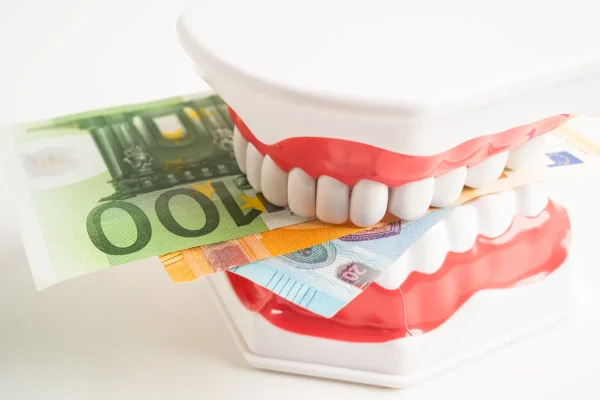
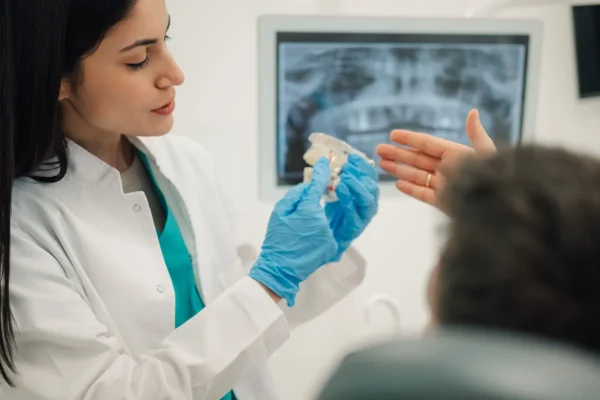
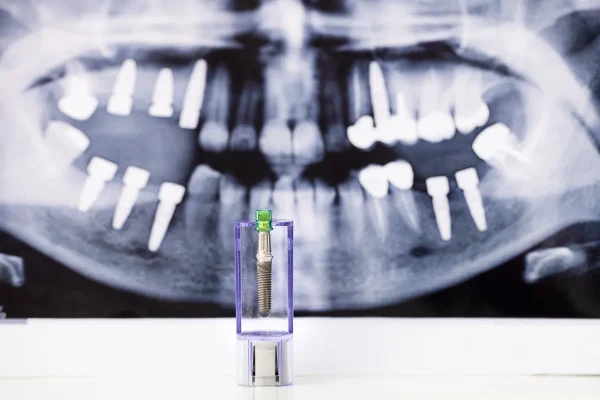
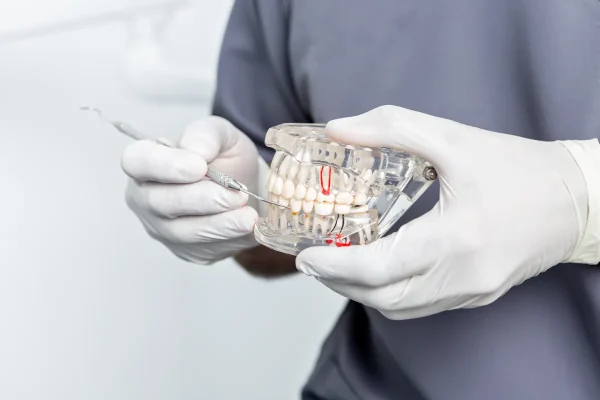

![Dental-Implants-NHS-e1747325783549-1024×915[1] Dental-Implants-NHS-e1747325783549-1024x915[1]](https://dentale-albania.com/wp-content/uploads/elementor/thumbs/Dental-Implants-NHS-e1747325783549-1024x9151-1-r5xyg5ea74oh73k9z5uv5amgw2c45uxhewp2r8hqqo.webp)






